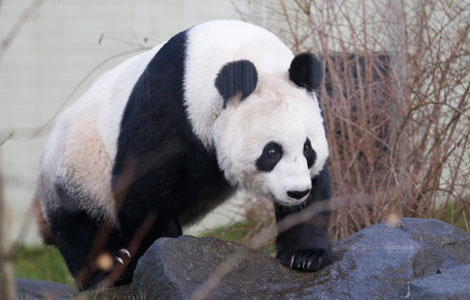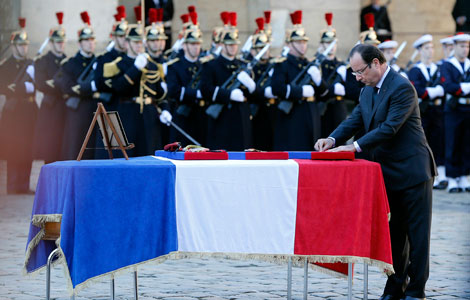

In a Cabinet meeting Tuesday a wholesale, revised defense program was approved, which also outlines a five year medium-term buildup of Japan's Self-Defense Forces' (SDF) personnel and hardware, as Abe and the United States take yet further strides to see the SDF potentially playing more active roles overseas.
To this end, the new strategy, as well as possibly revising Japan's weapons exports ban, which has been a constitutionally thorny issue, calls for a review of the longstanding Japan-U.S. defense accord, in a bid to bolster the two allies' defensive capabilities.
But while Abe in an earlier press conference Tuesday insisted that the medium-term and also the longer-term defense strategies have been designed with global peace and international transparency in mind, some analysts beg to differ.
Political pundits here have highlighted the fact that under the new guidelines, robust provisions will be made to integrate various units within the SDF, specifically Japan's Air, Ground and Maritime Self-Defense Forces, with an aim to improving the quality and quantity of the units and optimizing their mobility.
"The new strategy in the mid-term has earmarked a budget 230 billion U.S. dollars for the buildup of Japan's forces over the next five years, which is a massive hike in military spending for a country constitutionally committed to pacifism," political commentator and Shizuoka-based author Philip McNeil told Xinhua.
"The allocation covers a dedicated, fast-response-amphibious unit, with more than 50 vessels capable of reaching islands off Okinawa with ease and at pace and the budget will also see Japan's navy up their number of destroyers and the air force its fighter jets. Can we still call these Self-Defense Forces? I think not. Army, Navy and Air force. The debate on this now is purely semantic," McNeil said.
He went on to say that Japan is also prepping itself to be able to take preemptive missile strikes against overseas bases, a diversion from the current policy which already uses next- generation missile technology and radars capable of shooting down ballistic missiles, were such an attack be launched against Japan.
"Japan is also looking to increase its surveillance drone fleet, add F-35 stealth fighters and a number of combat vehicles to its armory, and according to Abe this is how 'proactive pacifism' translates. I fear, as well as alarming the citizens here ---- who elected Abe based on his dedication to fixing the economy and have found themselves with a pro-military, nationalist leader ---- Japan's neighbors will also be very, very concerned," he said.
"Japan is embroiled in a number of territorial disputes with neighboring countries in East Asia. Countries which have and should be Japan's closest allies in the region, both economically and in terms of security and diplomacy in the area, but while the prime minister here says the door for negotiations is still open, with the international community urging diplomatic resolutions to the escalating disputes, Abe is on a military warpath," said McNeill.
Along with Abe, senior Japanese politicians have also sent what seems to be a slew of well-intended mixed message to Japan's neighbors ---- in the one hand offering an olive branch and the promise of dialogue, increased diplomacy and peaceful resolutions, whilst in the other hand carrying a loaded gun.
Japan's Foreign Minister Fumio Kishida said Tuesday following the Cabinet meeting that Japan would, from now on, be committed to sending its government officials overseas to countries Japan is currently at odds with, to try to explain the situation and Japan' s intentions.
But as analysts have pointed out, a 230 billion U.S. dollar military buildup doesn't need much explaining. That much military spending and restructuring makes the situation quite clear.
Professor Hideki Uemura of Ryutsu Keizai University said Tuesday that while diplomacy and defense are the pillars of the national security policy, Japan is putting a lot of effort into defense and not so much into diplomacy and hence relations remain poor with some of Japan's closest neighbors.
Uemura urged Japan's leaders to seek a better balance between its foreign and defense policies to avoid an arms race in East Asia, saying that if there is no progress in diplomacy, Japan would have to rely on force.







